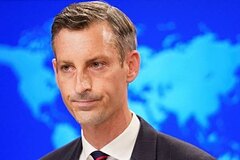State Department spokesman Price: Russian security proposals did not allay US concerns

Ned Price. Photo: Kevin Lamarque / Reuters
State Department spokesman Ned Price said that Russia's proposals for security guarantees in Europe did not take into account the issues of concern to the United States. He is quoted by RIA Novosti.
“We have not yet seen anything to allay our concerns,” he said during a briefing with reporters.
Price said Moscow has highlighted points of concern, but Washington has its own reasons for concern. The State Department spokesman stressed that any dialogue and diplomacy should be based on the principles of reciprocity.
Any dialogue and diplomacy should be based on the principles of reciprocity. They must respond to our concerns about Russian activities

Ned US State Department Representative
List of Concerns
Previously, Price said that the United States will present its own list of concerns about Russia's actions. At the same time, Price expressed his readiness for diplomatic work with the Russian Federation, but added that he could not yet report on specific plans.
Russia presented its list of concerns about US and NATO actions. We intend to work with our European allies and partners to present our concerns about Russia's actions that we believe are detrimental to our common interests and values.

Ned US State Department Representative
Security guarantees
On December 20, aides to the presidents of Russia and the United States, Yuri Ushakov and Jake Sullivan, held a telephone conversation, during which they discussed security guarantees. This was announced by the representative of the Kremlin Dmitry Peskov.
The press secretary of the head of state noted that the conversation was of a business and pragmatic nature. In addition, the Kremlin and the White House agreed to continue contacts.
Ushakov and Sullivan continued their discussion in the context of the well-known Russian proposals set forth in two draft documents and previously transferred to the American side. The discussion was businesslike and pragmatic.

Dmitry Peskov Press Secretary of the President of the Russian Federation
According to him, the leaders' assistants continued their discussion in the context of the well-known Russian proposals set forth in two draft documents and previously transferred to the American side.
Ukrainian question
A key place in the telephone conversation between Sullivan and Ushakov was given to the situation in Ukraine. According to the US presidential aide, progress around Ukraine requires an atmosphere of de-escalation, the White House press service reports.
He also noted that significant progress can only occur in an atmosphere of de-escalation, not escalation.

White House Press Service
The ministry noted that Sullivan in the conversation indicated the readiness of the United States to participate in diplomatic work through bilateral interaction, the Russia-NATO Council and the OSCE.
What has Russia offered to the United States?
On December 17, the Russian Foreign Ministry published draft agreements between Russia, NATO and the United States on security guarantees. The document, in particular, says that the United States should not create military bases in the territories of the former USSR countries that are not members of NATO.
The United States should not use their infrastructure for any military activity and should not develop bilateral military cooperation with them. NATO countries, according to the document, must refuse to conduct any military activity on the territory of Ukraine, as well as other states of Eastern Europe, Transcaucasia and Central Asia.
Russia also proposed not to admit countries that were previously part of the USSR into NATO. In particular, this requirement applies to Ukraine, whose authorities insist on their desire to become part of the alliance.
On December 20, Konstantin Gavrilov, head of the Russian delegation to the Vienna talks on military security and arms control, said that in the event of continued pressure on Russia from NATO, Moscow would give a military response.
The conversation must be serious, and everyone in NATO perfectly understands, despite all the strength and power, that it is necessary to take concrete political actions, otherwise the alternative is the military-technical and military responses of Russia

Konstantin Gavrilov

